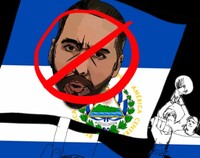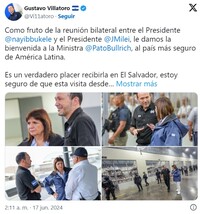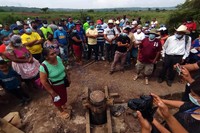El Salvador: lavoro minorile pericoloso nelle piantagioni di canna da zucchero
Il lavoro infantile domina nelle piantagioni di canna da zucchero in El Salvador. Bambini dagli otto anni usano i macete per tagliare la canna, lavorando fino a nove ore al giorno sotto u nsole cocente: sono conseutidine tagli alle mani ed ai piedi; l'assistenza medica, quando esiste, deve pagarla la famiglia dei bambini feriti e durante la racconta che avviene durante i primi mesi dell'anno scolastico i bambini non vanno a scuola.
Le compagni e che comprano lo zucchero salvadoregno usano quindi un prodotto ottenuto da lavoro minorile: benche' molte di queste compagnie, tra cui La Coca Cola Company, non autorizzino il lavoro minorile nelle proprie attivita' di produzione, il lavoro minoriel e' un fenomeno generalizzato nelle piantagioni che riforniscono la canna da zucchero agl izuccherifici del paese.
Human right watch chiede che il governo e le imprese facciano di piu' ; il governo aumentando rinforrzando le iniziative esistenti per vietare il lavoro minorile, soprattutto quello pericoloso e inseirire questi minori in programmi educativi e di formazione professionale, applicando la legge che garantisce l'accesso all'educazione; la Coca-Cola e le altre aziende sorvegliando le condizioni di lavoro nelle piantagioni da cui si riforniscono, rixconoscnedo le proprie responsabilita' nel garantire il rispetto dei diritti umani che include il divieto delle forme peggiori di lavoro minorile in tutta la catena produttiva, rispettando e favorendo i programmi e i servizi che offrono ai minori e alle loro famiglie delle alternative economiche e non limitarsi a far licenziare i bambini scoperti a fare lavori pericolosi
HRW fa appello a scrivere alla Coca Cola e all' Asociación Azucarera de El Salvador collegandosi al sito nelle note
*********************************************************************************************
la risposta giuntami dalla Coca cola company alla mia richiesta di intervento su invito di HRW:
Thank you for contacting The Coca-Cola Company, M. Margiotta. We appreciate the opportunity to address your concerns.
First, let me assure you that The Coca-Cola Company firmly opposes the use of child labor and has incorporated that requirement into our Supplier Guiding Principles (SGP) program for direct suppliers to the Company. Commercial agreements with direct suppliers require compliance with child labor laws under the Supplier Guiding Principles program.
We would like to share with you some important facts about actions we took when contacted by Human Rights Watch (HRW). The supplier sugar refinery, which is authorized by the Company and therefore subject to the Company’s supplier guiding principles program, was audited last year and no child labor was found. When HRW contacted the Company about their concerns in El Salvador, we acted quickly to fully review the policies and practices of our authorized supplier of refined sugar in El Salvador. We again verified that the refinery has its own policies against the employment of children in their facilities and that the mills which supply them also have policies against the hiring of underage children in their mills. In fact, HRW also confirmed that it found no indications of underage labor in either the sugar refinery or the mill supplying the refinery that supplies the Coca-Cola system in El Salvador.
HRW’s researchers subsequently advised the Company of their concern about child labor on four family-owned farm cooperatives that they believed supplied the sugar mill which in turn supplied the sugar refiner authorized by the Company. Our review has revealed that none of the four cooperatives identified by HRW supplied any products directly to The Coca-Cola Company, and that neither the Company nor the Salvadoran bottler have any commercial contracts with these farm cooperatives.
There are several programs to address child labor currently underway in El Salvador. Efforts by the sugar industry association in El Salvador, including programs its foundation conducts in partnership with the International Labor Organization of the U.N. (ILO), already show progress. In the case of the refinery that is the authorized supplier of Coca-Cola, the refinery, the mill that supplies them and the commercial farms from which they obtain their raw sugarcane, have strong practices in place to help prevent illegal child labor.
As a result of inquiries from HRW on the issue of child labor, the sugar industry association has advised the Company that it will increase its efforts in preparation for the 2004/05 sugarcane harvest as follows:
· Before the 2004/05 sugarcane harvest, meet with the cooperatives to 1) reemphasize to the coop leadership the industry’s zero tolerance of child labor consistent with Salvadoran law and insist that the farm cooperatives fully comply; and 2) encourage the cooperatives by providing incentives for them to become "model communities," i.e., lead by example (recognizing that the only way to ensure compliance is to convince the cooperatives that the use of child labor is not in their best interests in the long term);
· Increase monitoring and enforcement activities (including reporting offenders to local authorities) to ensure that the crop is harvested without the illegal use of child labor;
· Expand monitoring and ensure enforcement of mills’ right to terminate a contract of (i.e. refuse to buy sugarcane from) any entity that illegally uses child labor;
· Continue community work to help provide increased educational opportunities for children from the farm cooperatives.
It is also important to note that the "plantations" referenced in the HRW report are primarily family farm cooperatives growing sugarcane in El Salvador. These family farm coops (25-400 families each) are themselves the result of land reform to create economically viable local ownership of sugarcane production. These family-owned farms, in which the involvement of the entire family in the family enterprise has been a part of the cultural heritage for generations, represent the greatest challenge to the eradication of the use of child labor by farm families in El Salvador.
We believe that The Coca-Cola Company, within its role and abilities, can continue as we have for decades in cooperation with our bottling partners, to support education programs focused on helping improve the quality of life of youth through access to education. In El Salvador, we will work with our direct supplier to help them strengthen their outreach programs. We will also work with the sugar industry association as they continue to implement a major program with the International Labor Organization (ILO) to help families involved in Salvadoran sugarcane cultivation.
We have informed HRW that we will continue to play a supportive and appropriate role with our direct suppliers in El Salvador. We will work with others in government, local industry and civil society through approaches similar to those described by the sugar industry association for the upcoming harvest.
Thank you for taking the time to contact us on this issue and providing us the opportunity to share this information with you.
Tom
Industry and Consumer Affairs
The Coca-Cola Company
Articoli correlati
 Bukele ha utilizzato la mano dura contro la criminalità organizzata a scapito dello Stato di diritto
Bukele ha utilizzato la mano dura contro la criminalità organizzata a scapito dello Stato di dirittoEl Salvador: bukelismo sinonimo di repressione
Sono molti i paesi latinoamericani che confidano nella “bukelizzazione” della sicurezza senza considerare le violazioni dei diritti umani, civili e politici3 marzo 2025 - David Lifodi Incontro tra Patricia Bullrich, ministra della Sicurezza di Milei, e Bukele, presidente salvadoregno
Incontro tra Patricia Bullrich, ministra della Sicurezza di Milei, e Bukele, presidente salvadoregnoArgentina: repressione alla salvadoregna
Per esportare nel suo paese il modello di sicurezza caratterizzato da arresti indiscriminati e costruzione di nuove carceri.10 luglio 2024 - David Lifodi Confermati solo oggi gli esiti definitivi del voto che hanno sancito la dubbia vittoria di Bukele
Confermati solo oggi gli esiti definitivi del voto che hanno sancito la dubbia vittoria di BukelePresidenziali El Salvador: la frode
Il “dittatore più cool del mondo”, come ama farsi definire, si era già proclamato vincitore ancor prima della diffusione dei risultati preliminari e, con una schiacciante maggioranza al Congresso, può proseguire nel suo progetto di militarizzazione del paese.9 febbraio 2024 - David Lifodi Erano stati arrestati per aver denunciato un’impresa che agiva senza permessi
Erano stati arrestati per aver denunciato un’impresa che agiva senza permessiEl Salvador: liberati tre difensori dell’oro blu
Contro di loro è stata organizzata una vera e propria campagna di persecuzione dai media filogovernativi fedeli al presidente Nayib Bukele14 febbraio 2022 - David Lifodi
Sociale.network